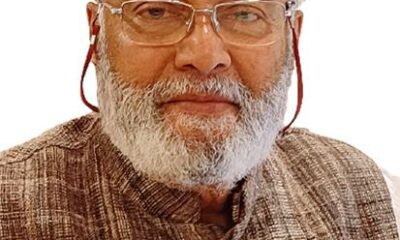National Issues
Exposing the Colic in the Turkey – What Must Change in the Nation -By Jimi Bickersteth
Granting that education has the potentials to contribute to economic development or growth its not an end in itself, hence, the need arise on which aspects of education should the nation be seeking to maximize. Should the emphasis be on producing a technically and professionally competent.

While on a lunch-break at a parley on: ”Media, Education and Good Governance as Forces Of National Integration in the 21st century” in this serene-setting of Akodo-Ajah, Lagos, and reminiscing on the new-found craze “…walk for…”, ” the take back your country,” and the “take-over-Lagos,” chants, something in me brought to my mind the pictures of the bitter, hard smile that remained after the laughter on the lips of Nigerians, lately!
A grand picture that was so palpable, a picture of a static society and an equally static performances of its political leaders. Leaders, who do not seem to know where the Eldorado is. What with there little action, dismal development of characters, and generally, all, acting like Forces in physics, acting by weight without producing movement; and whose instincts and ideas appeared distinctly passé.
The nation’s political history and the nation’s culture of leadership happened to be a complex one, if not simply complicated, because it was written in another culture, and in another language, and copying, translating, modifying and applying it for the good of society evidently was no small task. It has been daunting. Both involved understanding the truth as it was significant to the culture from where it came, then translating that significance to the nation’s life.
Politics sets out to address issues relevant to life and the fundamental issues of life. It is that relevance that makes government powerful. The Akodo beach close to the startlingly beautiful Lagos Atlantic city, with its lines of dunes and its broad wet ribbon of sand marking the receding sea, stretched for lonely empty miles. The breeze had stiffened, blowing the loose dry sand in little swirls that week after week, month after month, year after year formed the high sloping dunes that broke up the flatness of the beach.
My inner mind was wandering what the nation has made of its youths and democracy as I continued to study the many urchins, the youngsters, the lounging youths on the beach thoroughly enjoying their assorted drinks and smoking heavily this early afternoon. They looked far in advance of their years, they could look on a man my age as old and square whose ‘good’ looks, charm and experience were as nothing compared with the brash vital energy of some young slob their own ages.
I was jealous of their vitality and manifestly untapped energy and dismayed by their cheeky arrogance. I wanted to engaged some of them in some form of conversation to know firsthand what made them tick. I became afraid of youth, the shield that covered my shallowness was my looks and my charm and these I knew cut no ice with the motley crowd.
Now, thinking about it, the only two things apart from bad governance that could really frightened me were poverty and old age. To remain poor and
become old were concrete three dimensional nightmares that were truly
frightening — worse as a dose of living on air or a fool’s paradise, and like the mad scene in King Lear, I was frightened of whatever legacy the nation would bequeath to this maddening crowd of humanity and a nation whose development and progress is maddening slow.
A crowd that had hitherto been
neglected and could make no meaning of the nation’s political leaders and a ruling class that had made a damned mystery of governance and who often stayed demystified when confronted with the glaring realities of the nation’s true situations. A class that had snaffled a lot of the nation’s commonweath as a souvenir of the best years of their lives.
You begin to wonder why perfectly rational policymakers in government do not always bring their analytical rationality to play and why some public problems and or perception are not taken on as policies, and one begin to gain increased insight into the character of the nation’s political order and how the effect of none decision and benign neglect has been tragic for its system and body politic.
This afternoon, looking on this care free and recklessly wild ones, who would in later years bear the brunt of the nation’s political leaders spoiling the commonwealth, a vague feeling of uneasiness stirred at the back of my mind, as I left for the afternoon session of the parley.
The film of the youths at the beachfront brought to mind the salient issue of the nation’s social pyramid and what was wrong with them. It raised a quasi-methodical question; that relates to what can be approximately regarded as the policy of government, the logic and relevance, why it deals only with abstracts and theories; and the ground rules that provided the contexts within which formulated policies were influenced by the legislative arm and the reasons for policy inconsistencies and or somersaults.
Policies in essence, are nothing more than the instruments for governance. However, the job of governing is carried on by means of public policies. Good governance, therefore, require good policies. And producing good policies requires not only clear objectives and specifically targeted programmes, but also, readiness to articulate the overall consequences of any policy package and initiatives. But in this clime, political leaders were merely interested in consolidating their hold on political power, hold on to power than with actual governance.
Having said that, one conjectures that, futuristically, the nation’s political leaders should be able to design new and or redesigned old policies that were not ‘working’ for the nation and its good people. In these sense, the nation’s efforts at real development that had rather than helped promote integration weakened the basis for integration and development of national consciousness, because of lack of principles, over politicization and politics. The indifference, neglect and negligence on the part of the political leaders should be criminalized. The fact of that indifference which had hitherto generated disaffection, in spite of palliative proposed to ameliorate the pitiful circumstances.
In these connexion, the nation has to do a bit more by fine tuning policies that would aid national integration and poverty and use the media to fight inter-ethnic battles and appeals to base tribal sentiments to strengthen political positions, and using the Mass media to further such ends, thus, putting the nation from poverty crisis to political crisis, and a media over politicizing the ethnic dimensions of the nation’s crisis.
Of course, the media inability to promote national integration and government’s own irresponsibility at guarantying free press, an unfettered social media, liberty and a sustainable independent press is a basic policy failure since ‘flag’ independence. The thirty six states structure enhanced the stability of the nation’s political system by removing some of the strongest fears of majority and minority group domination, one must add in parenthesis that the six geopolitical structure and the Federal character principle were poor responses to the challenges of domination.
The thirty six states structure was a boost for the forces of integration, but, it also aided developments by creating many centres of power, thus, helping to bring development closer to the people. But recent experiences in the polity showed that even the constitutional framework has not eliminated political disharmony. When this is applied to the continued policy of government the result is that partisan and “statist” – here refers to the state as a subunit of the Nigerian federation, interests got substituted for ethnic interests in a nation that has found it difficult to articulate a national ideology that could guide the misguided guards and enhance its effectiveness at mobilization in favour of national consciousness and development.
Next, is the validity of the belief that education is the key that unlocks the door to economic independence and development and probably a notion that induced the nation to make investment in education. But in this climes, what the nation’s political leaders have really not took time to find out, is, precisely, what aspect of education promotes economic development in an era where Religious Knowledge, Fine arts and History graduates were enterprising entrepreneurs in agro-allied businesses.
A case can be made for the view that education leads to increased scientific knowledge and the latter, in turn, leads to greater technological awareness and sophistication. That technology increases man’s capacity to exploit nature, and that economic is nothing more than increased exploitation of nature. This theory would seem to justify adopting educational programmes that concentrate on building up society’s fund of scientific knowledge.
But, the poor teaching of science and mathematics, or should one say the reaction, lethargic reaction of the pupils to science and mathematics in the nation’s secondary schools and the universities bias for the humanities indicate that this theory of education did not inspire the nation’s educational programmes.
Yet, another theory of education linked to economic development singles out the quality rather than the quantity of education as the critical variable. The nation is hooked on the ‘opium’ of “Education is the key that unlocks the door to development”, and in the rush to provide that education, the leaders have not paid due cognisance and attention to the kind, types and quality of education they were giving society.
Once it is accepted that it is education of a certain ” kind” and “quality” that makes the difference, it also logically follows that education of the wrong “quality” and “kind” can be counter development and counter-productive. The nation’s orientation and literary bias of the present educational programmes probably do not qualify as the right kind and quality. Constructing the “right” kind of education does not start and stop with establishing and licensing universities, but is a political act requiring reason more than Zeal, rather than the present system that are inspired by mere zeal than by reason.
Education promotes economic development when it is geared towards providing scarce technical skills and broad literacy, unlike the types that saw the development problems of our kind of society as that of improper planning. One form of this improper planning is the failure to match investment in education with the needs of the economy, and an eloquent testimony, is that, the society suffers simultaneously from both ‘educated unemployment’ and shortage of high technical skills.
For a lasting solution, there is the need for manpower planning and a review of the nation’s education policies, even, as the government study the social effects of unemployment. An extension to this argument and the nation’s ‘educated unemployment’ in our society is that the nation did not invest enough in physical capital which is more directly productive. A more viable strategy, is to invest more in directly productive enterprises; this will then generate resources which can then be invested in the non-directly productive educational sector, as well as provide jobs for the products of the investments in education.
It is a short step from here to the conclusion that the nation’s investment in education since independence, has been ironically counter-developmental in the sense that, by siphoning off its very scarce resources into the non-directly (that is not immediately) productive sectors like education, is crippling the economy’s capacity to undertake the more crucial investment in the directly productive sectors.
Granting that education has the potentials to contribute to economic development or growth its not an end in itself, hence, the need arise on which aspects of education should the nation be seeking to maximize. Should the emphasis be on producing a technically and professionally competent
elite – that is, if one takes a narrowly economistic view of education’s contribution in efficiency terms – or should the nation aim at raising the general competence of the population – that is, a call for more mass-based education. A conscious review of the nation’s policy on education in consonance with the present day realities would pinpoint the right mix.
For the here and now, the nation’s simultaneous expansion of educational facilities at both the primary and secondary schools and the competition for establishing universities, seems to suggest that the nation’s educational policies did not take unambiguous position of this argument. The nation’s zeal in using education as a grand strategy for tackling society’s developmental problems is not coupled with the the kind of discriminating attitude that could package specific educational programmes for specific policy goals.
One result of this was that the nation’s educational policy arena produced all sorts of unintended consequences. Two of which stand out;
i. as the general educational level of the Nigeria’s society was rising, the productivity of the country was declining. Obviously, that education has vitiated the very people it’s supposed to raise and support from work-ethic and self-help ethos and pride in the dignity of labour.
ii. The steady decline in agricultural production, migration to urban centres in search of nonexistent employment are all inspired products of the same unintended effect. The nation’s education policy should thus receive great critical reviews.
The educational competition in the federation from the East to the West was as much productive of inter-ethnic disharmony as the educational imbalance of the North and South destructive of the seemingly fragile national cohesion, no matter how much the nation tried to sweep it under the carpet, retarded development coupled with a democracy that is taking for ever to remain nascent, and the inability in not being able to use education to socialise for national consciousness.
The consignment of primary and secondary schools as the responsibilities of the Local and state Governments respectively has continually denied the Federal government the opportunity of mobilising these levels of education for national integration. No attempt was made to build into the schools curricula a national ideology or even exposure to authentic Nigerian history as strategies for building up student attachment to a national identity. It still remained inexplicable, how the political system with so much generalized faith on education have a society that has remained unconcerned about the political content of its popular education.
America used her school system to “melt” her pot and assimilate her immigrant population, Russia used their system both to assimilate her Asia populations and generate enough consensus to enable the political system survive severe shocks from within and without. Germany depended heavily on her schools to rebuild her post-war democratic political culture. China and Cuba both used their educational systems to shore up their post-revolution society and world-view.
Nigeria alone of the major modern societies, neither use her schools to generate a new post-military consciousness nor induced affection for both state and fellow compatriots among Nigerians. Yet, Nigeria’s recent history, without oversimplifying demand mobilising her educational systems for these goals. To speak a new paradigm in growth, development and integration, the government and the national assembly must resolve to:
a. Employ policy analysis as a strategy for understanding the character of the political system.
b. Aim at raising the bar and
improving the ability of political practitioner’s to produce more sophisticated policies.
c. The need to probe the dynamics and consequences-intended and unintended- of policies, to anticipate interactions effects when more than one policy is involved, to ensure that specific programmes are approximately targeted at some specified objective or goal, to monitor ongoing policies so that preemptive actions can be taken where there is evidence of an undesirable effect.
d. To recognise that
non-decisions have consequences as important as those of formally articulated policies.
When there was no moon, but the black sky was pinpointed with stars. The thought of returning to the wind,
the no-light, the ulcer-forming pressure of Lagos depressed me. At sixty plus, I found the desk work, the long hours in the office and the nag-nag-nag of the telephone a drudgery.
#JimiBickersteth
Jimi Bickersteth is a writer and a blogger.
He can be reached on Twitter
@bickerstethjimi
@alabaemanuel
@akannibickerstet
Email: jimi.bickersteth@gmail.com










